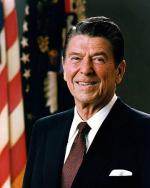
Thirty years ago, on March 23, 1983, U.S. President Ronald Reagan delivered a televised speech in which he announced a program called “Star Wars.”
Some of Reagan’s biographers maliciously note that the president came up with the Strategic Defense Initiative — also known as “Star Wars” — by remembering the scene of an airship being destroyed in the 1940 film “Murder in the Air” in which he starred. However, even in the ’80s, the idea that an opponent’s rockets could be destroyed with a laser is said to have caused a smile of incredulity to spread over the face of British Prime Minister Margaret Thatcher. Regardless of how realistic the concept of “Star Wars” was back then, the president’s ignition of the arms race from 1981 to 1985 had the effect of accelerating the bankruptcy of the “Evil Empire” — as Reagan called the USSR — and of the entire world of communism.
Reagan based his politics on two elements: the military doctrine “peace through strength” and in the economic sphere, the deep conviction that Roosevelt’s America was pulled out of crisis not because of the social politics of the “New Deal,” but because of the economic situation caused by the war a few years later.
Today, not many remember that during the first two years of Reagan’s presidency, America was living in the shadow of Democrat Jimmy Carter’s previous presidency — considered one of the 10 worst presidencies in American history — which meant serious economic problems, including a two-digit unemployment rate.
Ronald Reagan knew that in as much as a weapon can bring peace — especially in the hands of a “good” cowboy — the government should stay far away from the ranch. The common American associates Reagan’s era with a decrease in taxes (about 25 percent in average), a simplification of laws (some economic documents from that time are single pieces of paper), and a lowering of the state’s expenditures. Reaganomics, as the new economic trends were called, worked within two years, allowing for 20 million new jobs and seven years of unprecedented economic growth. Today — 20 years later — the principles adopted by Ronald Reagan remain the economic bible of American conservatives, who criticize President Barack Obama’s socialist government.
Ronald Reagan was the last political cowboy of America. He left behind a model of capitalism that brought prosperity to all Americans, as well as a handful of aphorisms, worthy of use in a good western. Such remarks as, “Mr. Gorbachev, tear down this wall!” — in 1987 at the Brandenburg Gate — or “I am not worried about the deficit. It is big enough to take care of itself.”

Leave a Reply
You must be logged in to post a comment.